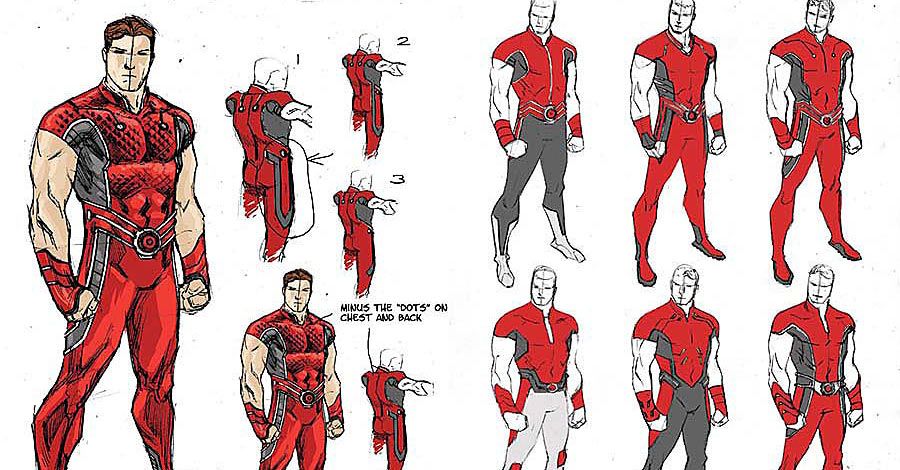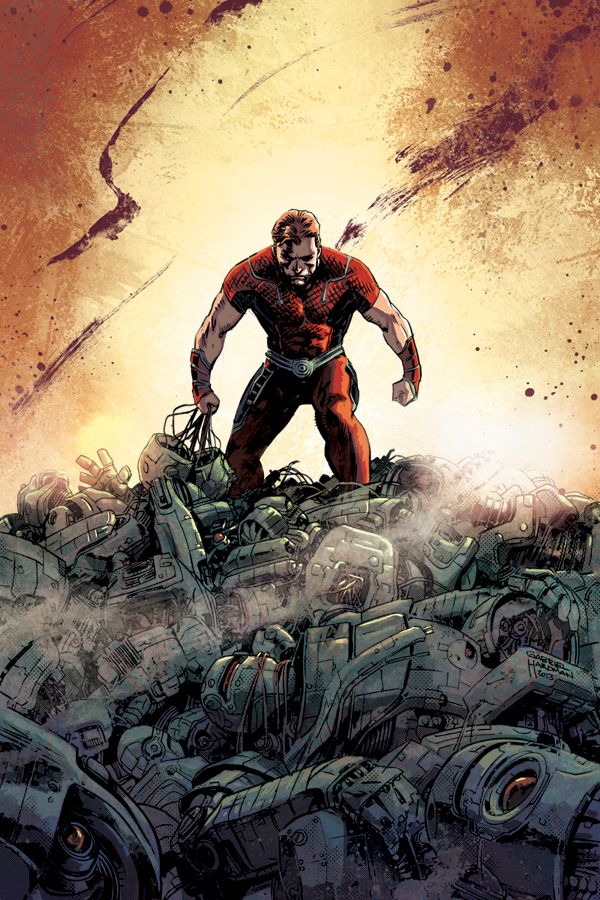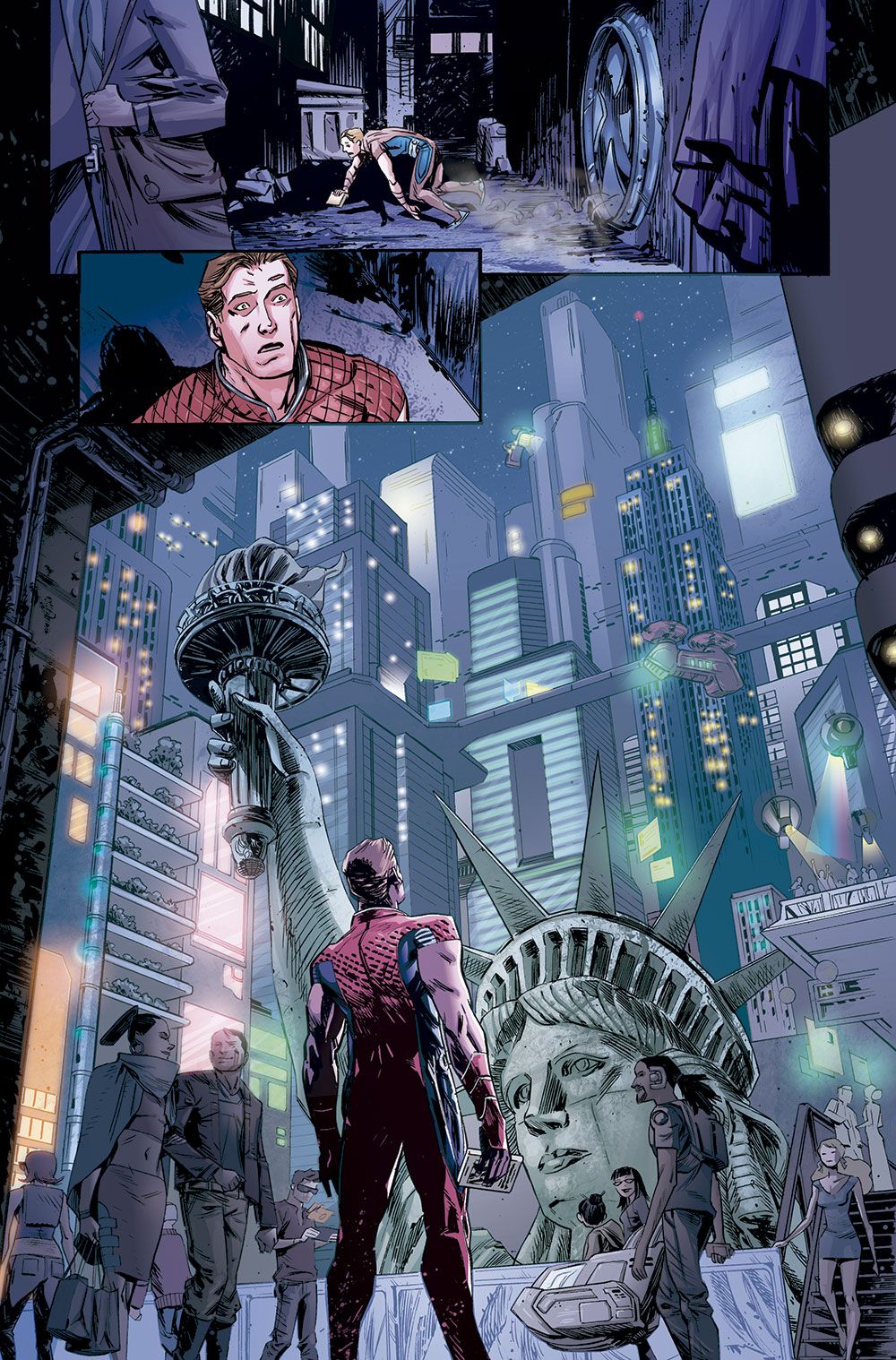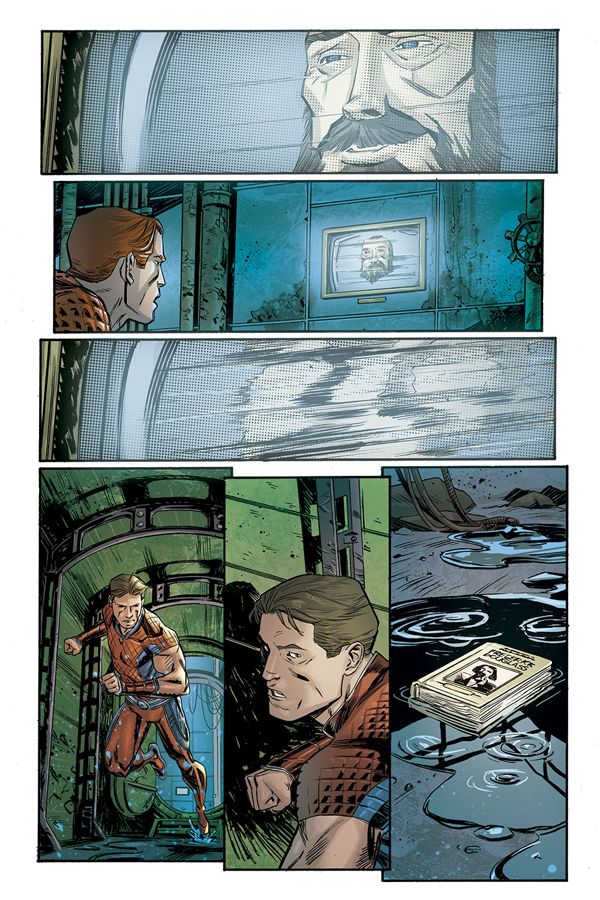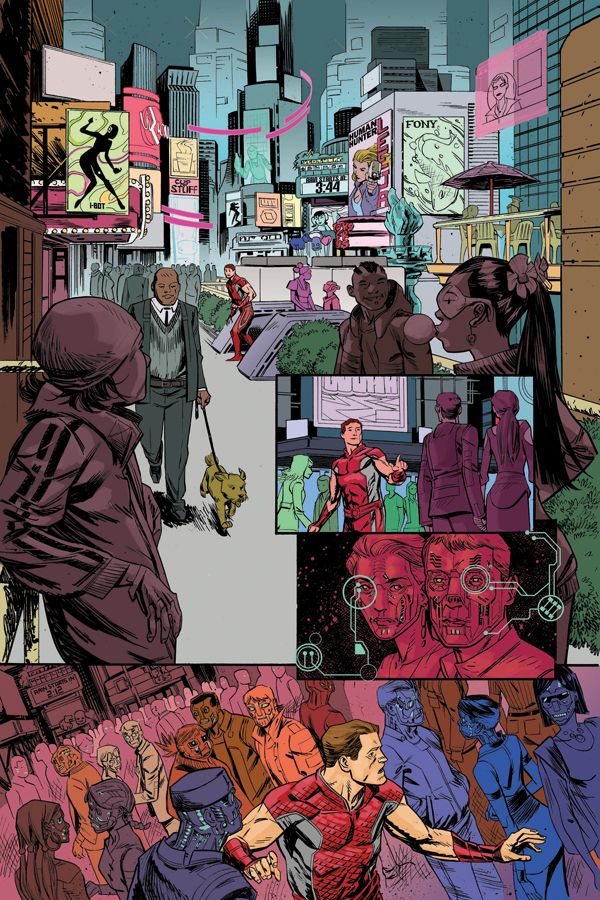For his latest Dynamite Entertainment series, writer Fred Van Lente is bringing out a comics revival, but fans of "Magnus: Robot Fighter" shouldn't be expecting a retro affair.
The original android-punching, leotard-wearing sci-fi hero was created in 1963 by cartoonist Russ Manning for a line of superhero-esque characters at then-industry giant Gold Key. The character lasted intermittently into the early '80s alongside the likes of Turok, Solar and Doctor Spektor, several of which were part of Valiant's original '90s launch and all of which are the subjects of Dynamite revivals this year. In March, a new "Magnus: Robot Fighter" #1 arrives courtesy of Van Lente and artist Cory Smith, and this time out, the hero is being rebuilt from the ground up for a new generation of readers.
EXCLUSIVE: Gold Key Revived at Dynamite by Pak, Van Lente & More!
CBR News spoke with Van Lente about the series, and the writer explained that in the 21st Century, a story of man versus machine needed a new angle, shared how the early Manning comics impact his book and his cast, shows what the new world of "North Am" will look like and much more.
CBR News: Fred, everyone knows that you're a comics historian thanks to your work on "Comic Book Comics." So were you extremely familiar with the ins and outs of the Gold Key characters? Or I think it went Dell, then Gold Key, then Whitman --
Fred Van Lente: Yeah, it's super confusing. [Laughs] Turok, I think, is the only character that started at Dell. Magnus and all the rest originated at Gold Key. I am actually old enough, sadly, to have bought Magnus, Doctor Solar and Doctor Spektor off the rack when I was a kid, because Western, which carried Gold Key, reprinted a bunch of those stories, and you could get them at drug stores. So I actually read those.
Most people remember these characters from their early Valiant incarnations, but I always found "off brand" superheroes fascinating when I came across them as a kid. Did you have a similar reaction?
Yeah. I loved "Firestorm" and "Batman & The Outsiders" and "Alpha Flight." Now I look at all that stuff and go, "I'm not quite sure I had the best taste when I was nine." [Laughs] But what are you going to do? But I did like being in on the ground floor of new stuff, and my parents got me these paperback collections of "Amazing Spider-Man" and "Fantastic Four" and "Hulk" when Kirby, Ditko and Lee were doing them. So really, when I was old enough to buy my own comics I felt like, "I already know about Spider-Man. Who's this guy with his head on fire? I'm buying that!"
Of the Gold Key comics I read back then, Magnus was always that character who I remembered. For this, Dynamite got me copies of all the original '60s issues to refresh on, and back then Russ Manning -- the writer/artist who created Magnus -- did some incredible science fiction comics. Sure, they're dated by our standards, but they're still super fun and they stand out as great comics.
How do you take all that influence and turn it into a new series? Even though it was cutting edge for its time, it seems like if you took a direct influence from the Russ Manning era, you'd end up doing a retro-futuristic series, and I get the impression that's not what your "Magnus" is.
I'm totally rethinking the whole concept. This is a ground-up take because the sciences of robotics, artificial intelligence and cybernetics have advanced so far, even from the '90s when Valiant was doing this. Back then, Valiant was really doing an extension of the old Gold Key series. We're doing a total rethink, out of necessity.
Basically, in my version, Russell Magnus is a gym teacher in a small town where there are robots. The town is run by this artificial intelligence called 1-A, whom Russell treats as a father because it raised Magnus from when he was a kid. One day, after a violent attack by seemingly hostile robots, Magnus wakes up in this sprawling megalopolis called "North Am" which basically constitutes the entirety of the North American continent. It's sort of the exact opposite of Mega City 1 in "Judge Dredd." Where that city takes up the entire continent, this was designed by robots who edited down the continent. They deleted all the space they thought were the inconsequential parts of North America...you know, like fields. [Laughs] So now you could walk from New York to Chicago in about six hours.
Magnus has woken up in this world where robots have become indistinguishable from humans, except by Magnus himself. Meanwhile, the robots have a theology, and essentially, they're created to be as close to humans as possible so they can take us over for our own good. Magnus has got to try and fight his way back to his home, if that's even possible. To many, he's a hero. To many, he's a villain. It all depends on what the difference is between the good robots and the bad robots in North Am, which is something he's trying to figure out.
Good science fiction is always as much about the present as it is about the future. Is there something about society today that you felt rang true in this series?
To me, whenever you make a copy of something -- compare this to torrents or sampling or whatever you like -- we're trained as humans to think of the original or more authentic thing as being better than the copy. But with robots as the predominant force in this society, the copy becomes better than the original. That's what drives a lot of this. Particularly in comics or in art, people get obsessed with the origins of things, and in a world like North Am, a lot of those ideas get very confused. The simplest way to say this is, "What does it mean to be human?" But really what it's all about is, "What does it mean to be authentic?" or, "What does it mean to be real?" It's like when you're on social media versus real life, or how you are with your parents versus your friends. We all put out different copies of ourselves, and not necessarily in an underhanded way. We just do it to get through our lives. Those are the kinds of philosophical questions I'm interested in here.
Aside from the broader world, I know there is a big cast of characters to inhabit the comic, which we've seen in the early designs from the book. What can you say about the people we'll meet along the way?
Cory Smith is freaking amazing on those designs. He's been knocking it out of the park, and I'm sure he'll get hired out from under us eventually. [Laughs] But most important here is Leeja Clane, who was the love interest in the original "Magnus." She's got some competition this time around! We've made Leeja very different in this version than in the previous one. Gender roles were pretty narrowly defined in comics in the '60s, and when I did "Hulk: Season 1" with Tom Fowler, we had fun inverting a lot of those tropes. Betty Ross, in the original series, was just "the general's daughter," and we said, "She's still the general's daughter, but she's also a kick ass soldier in her own right." Now, with Leeja Clane in "Magnus," she's the daughter of a big deal mucky muck Senator in North Am, but she's a pretty bad ass bounty hunter in her day job. She's a marshall/human hunter, which means she's a human hunting down her own kind. That puts her into immediate conflict with Magnus. In this first arc, she's essentially the bad guy. If she remains so and how she'll respond to Magnus' world view, we'll see once she comes into contact with him and his philosophy. That will all unfold as the story goes.
What's it been like working on this as part of a whole line? I know that so far the other books like "Turok" from Greg Pak and the upcoming "Solar" from Frank Barbarie are similarly starting out in their own corners storywise, but has Editor Nate Cosby been getting you guys to think more broadly in terms of world-building?
Yeah, Nate has been great about sharing scripts with everyone. The scripts are all really excellent and very different. Greg's is essentially an alternate history, since there are Native Americans and dinosaurs. Mine is obviously science fiction. Frank's is a modern science superhero tale. And Mark Waid's "Doctor Spektor" is full of the weird and the occult.
Nate kind of discovered me at Marvel and put me on the map in the first place with "Incredible Hercules," and he told me this was the best thing he's ever seen me do, which is very flattering. I don't know whether it's true or not, but I love hearing it! [Laughs] It's definitely one of the most different things I've ever attempted to do. What's fun about "Magnus" is that the first year has a definite beginning, middle and end. It really lets me put my stamp on the characters.
And I should add that DreamWorks Pictures now owns these characters. They've been very involved with these new origins, and they're super fun to work with. That's always exciting when you work with a licensor -- to be on the same page.
"Magnus: Robot Fighter" debuts this March from Dynamite Entertainment.

